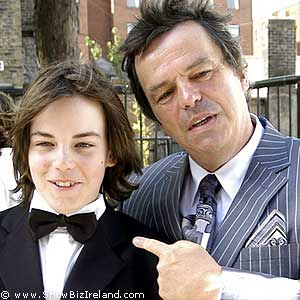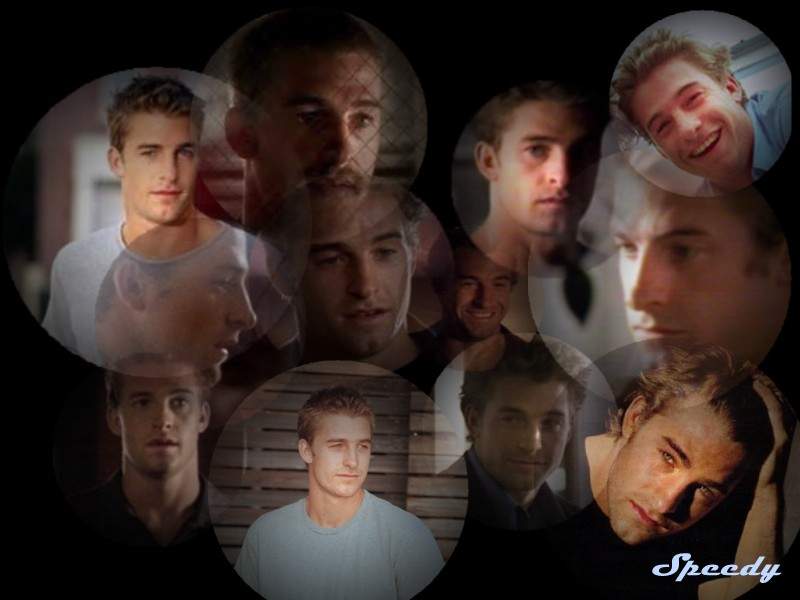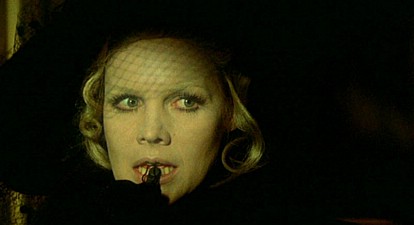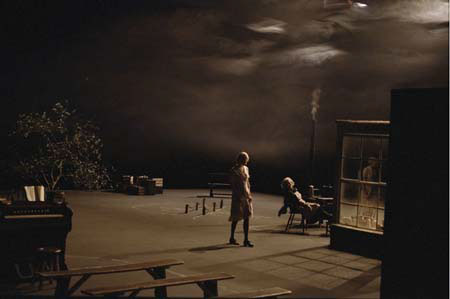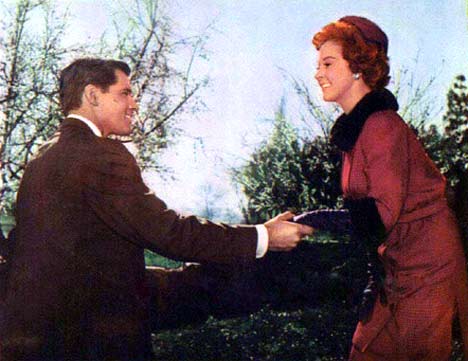Welcome to Russelland
Okay, so if y'all think I haven't been watching much lately, or at least not writing about it, you couldn't be farther from the truth. As you may know, I have been watching the films of Ken Russell like a madman in order to write a lengthy article on (what has become) Hysteria in his films. So, to make up for a lack of writing (and an attempt to keep you from going totally crazy, hearing about Russell's films every day) I will deliver a one sentence summation of my thoughts on the films that I have recently watched.

Delius: Song of the Summer is perhaps more interesting to understand what Russell was reacting against. Though Delius is very well made, it's mannered nature is completely alien to those whose conception of Russell lies in the later films like Tommy. It is Russell gloriously bowing out of a 10 year relationship with the BBC.

Women In Love is truly quintessential Russell. A must for any cinefile. Take special care to notice the moment where the film departs from traditional narrative delivery as this is the primary focus of my forthcoming paper.

The more I read about The Music Lovers, the more I find it to be a well made film. Russell's faults are very apparent here, but so is his glory. The end sequence set to the 1412 Overture is BRILLIANT and Glenda Jackson is, as Mike Clark stated in USA Today, "brilliantly bonkers."

The Devils is Russell's undeniable masterpiece. Every pun is right on the money and every instance of shock editing works, a: because of the political undertone of the film, and b: because of the insanity of the subject matter. If The Music Lovers was described by Russell as a story of "a homosexual composer who falls in love with a nymphomaniac," then all one needs to say of The Devils is Vanessa Redgrave as a hunch-back, self-flagellating nun in love with an over-sexed priest.

The Boyfriend is an overdrawn mess of a lighthearted musical meant to follow The Devils as proof of Russell's ability to diversify. It only succeeds in being a glutinous exposé of Twiggy's mediocre talents. There are some great sets, but overall this film is a sugary dud.

Russell's Savage Messiah is a low budget return to his BBC days. The film depicts a early 20th century sculptor whom Russell himself would most like to be. The boy is impulsive, artistic and completely driven by his desire to create. Sadly it drives him to the fronts in WWI. This is Russell's absolute proof of his ability to restrain himself. A trait he would seldom use in the years that followed.

Mahler is a failure. What starts off as a promising experimental narrative becomes extremely haphazard in terms of timing. The film folds in on itself half way through, which is a pity, because the first twenty minutes are perhaps the most aesthetically glorious minutes Russell has ever created this side of The Devils

It would seem that Russell finally found the avenue to exert his OTT tendencies with Tommy. Most people have seen the film, and those who haven't really should. I actually have very little to say about the film, as all 111 minutes of it are distilled down to the 2 minute sequence in which Ann-Margaret writhes in the mixture of Soap suds, chocolate and baked beans. It says what Russell intended The Music Lovers to say quite succinctly in a minute fraction of time(though it seems like an eternity while you're watching it).

Lizstomania is unwatchable.

Likewise, Valentino finds Russell at his most uninspired. He was probably playing it safe after the box-office horror that was Lizstomania, but there are only a few pearls in this by the book biopic. Of course, Carol Kane's teensy weensy role is one of them
Taking a stab at Hollywood (all of his prior films being made in England), Russell found enormous success in Altered States. In a static way, the film is an Americanized version of a Ken Russell film. Though marking the first starring role from William Hurt, Altered States is a film all too self-conscious of its maker's visual expertise. It therefore becomes lazy and it's moments of psychedelic frenzy are less exciting than one might expect. Though a huge success, it would not spark greatcontroversyy like Russell's next Hollywood picture.

I cannot for the life of me believe that Kathleen Turner does not regret making Crime of Passion. The film opens with her reciting her Miss America acceptancespeechh, straddled in gynecological stirrups, being eaten out. This is onewallopp of a film. The moments of Russell's trademark hysteria are superb and when not dwelling in them, Russell discovers a brilliant use of the absolute mundane. The dull parts of this film are positively essential to the movie as a whole. Russell revels in both the boring and the sensational. The key scene of former being the endless shot in bed with the curtains moving in the breeze. On the other hand, there's the scene where Turner sodomizes the cop with the nightstick.

After fleeing from Hollywood because of his complete distaste for the city (can you blame him?), Russell, direly in need of money, signed a five picture deal with Vestron Home Video. This would prove to be a grand relationship yielding the second most prolific period of Russell's production. Gothic was the first offering. I must admit I am biased. Gothic was the first Ken Russell film I ever saw, when I was an impressionable youth no less. The film scared the shit out of me and to this day I think it a wonderful and terrifying film. Russell decides to exorcise the adage, "there's nothing to fear, but fear itself." The "scary" in the film is fear, and our outrageous cast (Julian Sands, Gabriel Byrne and Redgrave's daughter,Natasha Richardson) finds creepy manifestations of their worst fears around every corner. Notice the credit sequence. It perfectly states Russell's attitude to not only the film, but the genre as a whole.

Salome's Last Dance finds Russell in top form. From a bare bones budget, Russell creates universe in which all of his stylizations and indulgences make perfect sense. Leave it to Oscar Wilde to yield the material with which Russell can most be himself. This is Glenda's last hoorah for Russell, as even though she appeared in his later D.H. Lawrence adaptation, The Rainbow, this is certainly the last time she exerted her ferocious camp wonder over the likes of a Russell film. An interesting side note, Imogen Mallais-Scott, the actor portraying Salome is in fact deaf, though one could never tell by merely watching the film.
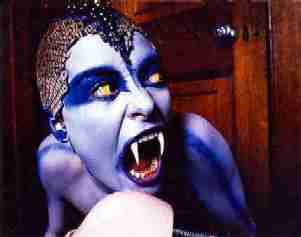
Russell's greatest camp following is based around his adaptation of Bram Stokers The Lair of the White Worm. Again, Russell descends into Russelland with wondrous results. The budget restraints prevent him from going too far over the top, but just enough to revel in the absolute absurdity of the film. Amanda Donahoe(pictured left) steals the show as the snake woman Lady Sylvia Marsh. It is when she is on screen that Russell's glibness shines. It is also worth mentioning that purchasing the older DVD edition of the film is truly in your best interest as it features the most side-splitting commentary I have ever heard with Russell, proving once and for all that he is, in his words, even, "totally mad."

The Rainbow was Russell's attempt at revisiting safe territory in hopes of restarting his career. In re-envisioning Lawrence, Russell disregarded all of his trademark stylizations that made Women in Love an exhilarating film, and made, what I assume in his mind was a proper English countryside movie. Now, to anyone else, this does not include graphic, gratuitous lesbianism. It is, sadly, a positively dull film.

With thatabysmall film under his belt, it would seem Vestron slashed his budget, as Whore is Russell's most low rent movie to date. Staring Theresa Russell (no relation), the film promises a gritty look at the life of a streetwalker. If by gritty you mean economically meager and energy deficient, Whore lives up to its promises. It is so bad that at times it is almost good. Take for instance, the editing of Theresa's epiphany at the movie theater. This becomes the best moment of the film because it is so unabashedly poor.

Mindbender is proof that it was only down hill from here. This is the positively dreadful film of the life of world famous spoon bender Uri Geller. Not even Terence Stamp saves this from being, not even Russell's most poor, but also most uninteresting film ever.

As Russell drifts into obscurity, he secludes himself in his house funding his own films, which he films on DV using himself, family members, and those talents that he can afford, namely strippers. The Fall of the Louse of Usher is one such travesty. Russell merely lets every dick and shit joke loose, discards narrative for a malaise of camp carnality and puts himself in the actor's seat as the "mad scientist" who, I have yet to finish the film though I started it mid summer (it is really that much of a chore), a friend informed me at the halfway point in the film, Russell looks dead into the camera and says, "you think this is bad, you're only half way through." In some sick place, this is tongue in cheek. Sadly, that place is the land which Russell occupies now, and from where he shall probably never return. Our loss.







